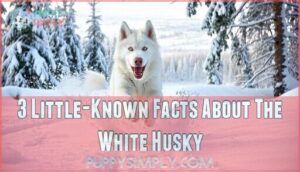This site is supported by our readers. We may earn a commission, at no cost to you, if you purchase through links.

These arctic beauties aren’t albino; they simply carry recessive genes that eliminate darker pigmentation. They’re born this way and keep their pristine coats throughout life.
You’ll find they need the same exercise, training, and care as any husky, but their striking appearance makes them true head-turners. Understanding their genetics reveals fascinating breeding secrets, and their unique look is due to a specific genetic combination.
Table Of Contents
- Key Takeaways
- Is It The Same Breed as The Siberian Husky?
- What Do They Look Like?
- Are The White Husky Puppies Born White?
- What Makes Husky Become White?
- Do They Have a Friendly Temperament?
- How Do I Know if I’m Ready to Welcome My Husky Home?
- 3 Little-Known Facts About The White Husky
- Temperament, Personality, & Intelligence of The White Husky
- Things to Know When Owning a White Husky
- Frequently Asked Questions (FAQs)
- What is a full white Husky called?
- How much is a white Husky worth?
- Is Samoyed a Husky?
- What is the price of pure white Husky?
- How difficult is it to find a White Husky?
- How much exercise does a White Husky need?
- Is it recommended to adopt a White Husky from a shelter?
- Are White Huskies more expensive than standard Huskies?
- How can I ensure I’m getting a healthy White Husky puppy?
- How much do white husky puppies cost?
- Conclusion
Key Takeaways
- You’re looking at the same breed – White huskies are purebred Siberian Huskies, not a separate breed, with the same friendly temperament and abilities as their colorful relatives, just carrying rare recessive genes that create their stunning all-white coat.
- They’re born white and stay white – Unlike other coat variations, white husky puppies are born with their distinctive coloring and maintain their pristine white appearance throughout life, making them true head-turners wherever you go.
- You’ll need serious commitment – These arctic athletes require 90 minutes of daily exercise, consistent training to handle their independent streak, and mental stimulation to prevent destructive behaviors like excessive howling or furniture chewing.
- They’re surprisingly affordable – Despite their rarity, white huskies typically cost $500-$800 from reputable breeders, often less expensive than standard huskies, though champion bloodlines can reach $1,500 or more.
Is It The Same Breed as The Siberian Husky?
You might wonder if your dream White Husky is actually a different breed altogether.
Looking at a White Husky and questioning if it’s truly a Siberian Husky? You’re not alone in this common confusion.
Here’s the straightforward answer: the White Husky is absolutely the same breed as the Siberian Husky.
It’s simply a stunning Color Variation within the established Breed Standard, not a separate breed requiring special Hybridization Risks considerations.
Many Breed Misconceptions suggest White Siberian Huskies are somehow different in temperament or abilities.
That’s not true.
The Genetics behind their pristine Coat Color comes from the same Genetic Ancestry as their darker relatives.
The American Kennel Club recognizes white as an official color variation, putting these misconceptions to rest.
You’re looking at a purebred Siberian Husky that happens to wear nature’s most elegant coat.
Their DNA, temperament, and physical capabilities match their colorful cousins perfectly.
The only difference? They’ve inherited a recessive gene that creates their breathtaking all-white appearance.
What Do They Look Like?
White Huskies captivate with their striking appearance that sets them apart from standard Siberian Huskies.
Their breathtaking features include:
- Thick double-layered white coat that shimmers like fresh powder
- Almond-shaped eyes in brilliant blue or warm brown
- Fox-like triangular ears that perk up with curiosity
- Bushy tail that curls over their back like a plume
- Wolf-like facial features with a black nose
These pure white beauties showcase stunning coat variations from cream to snow-white, paired with piercing blue or brown eyes that seem to see straight through you.
Size differences between males and females remain consistent with other Huskies, as they share ancestry as Arctic sled-pulling dogs, known for their thick double-layered white coat and breathtaking features.
Are The White Husky Puppies Born White?
Yes, white husky puppies are born white, but here’s the fascinating part – you won’t see their true coat until they’re older.
Newborn appearance can be deceiving since all puppies start with softer, fluffier fur that changes as they grow.
A white husky puppy’s coat typically becomes more defined around 8-12 weeks old. During this time, pigment development occurs, and you’ll notice if your pup carries the pure white husky genetics or if other colors will emerge.
Environmental factors like sunlight exposure can also affect how the coat appears.
The recessive gene responsible for the white coat means both parents must carry it for truly white offspring. Some puppies might look cream or slightly yellow initially, but genetics will determine their final appearance.
Puppy coat changes are normal, so don’t worry if your white husky doesn’t look perfectly white immediately. Color inheritance follows predictable patterns, making breeding outcomes more reliable.
What Makes Husky Become White?
You’ll find that a white Husky’s stunning coat comes from a recessive gene that both parents must carry for their puppy to be born completely white.
This genetic combination happens rarely in nature, which explains why these beautiful Arctic dogs are much less common than their darker-colored relatives, due to the unique genetic requirement for the white coat.
Inheritance of Coat Color
Your white husky’s stunning coat color comes from a fascinating genetic dance between parent dogs.
Nature’s genetic lottery creates these arctic angels through a beautiful dance of inherited traits.
When both parents carry the recessive gene for white fur, their puppies have a chance at inheriting this rare trait.
It’s like rolling dice with genetics – you need the right combination to hit the jackpot.
Here’s how coat color inheritance works:
- Recessive Genes – Both parents must carry the white gene for white offspring
- Color Purity – True white huskies have completely white coats without markings
- Breeding Outcomes – Only 25% of puppies from carrier parents will be white
Genetic testing helps breeders understand breeding outcomes while avoiding albinism risks.
Genetic Mutation
Beyond inheritance patterns, specific genetic mutations create the stunning all-white coat you see in these Arctic beauties.
The MC1R gene mutation at the E locus prevents your White Husky from producing black or brown pigment, resulting in that cream-to-pure-white appearance.
Two mutations, e1 and e3, cause this recessive gene expression in Siberians.
However, breeding risks include albinism causes when the TYRP1 gene affects melanin production.
Understanding these genetics helps you distinguish between true white coat color variations and potential albino husky conditions that impact genetic health differently.
Breeding for Coat Color
Breeding for specific coat colors requires careful planning and ethical practices. Reputable breeders use genetic testing to identify carriers of recessive genes that produce white coats. They select parent dogs based on their genetic profiles, not just appearance, to maintain color purity in White Siberian Husky offspring.
However, ethical concerns arise when breeders prioritize coat color over health. Responsible breeding focuses on the dog’s overall well-being first. Breeder reputation matters substantially – experienced professionals understand genetics and can predict coat outcomes while maintaining breed standards.
You’ll find that breeding two White Huskies guarantees white puppies, but breeding non-white Siberian Huskies carrying the recessive gene only produces 25% white offspring. This genetics principle explains why White Husky dogs remain rare despite growing demand for this stunning Arctic variation. Coat color in animals is determined by melanocortin 1 receptor genes.
Do They Have a Friendly Temperament?
Understanding a White Husky’s genetics leads us to their wonderful personality traits.
These dogs pack incredible warmth into their stunning arctic appearance.
Their Siberian Husky temperament shines through with remarkable friendliness toward humans and other dogs.
However, their personality comes with specific considerations for family suitability:
- Socialization needs require early exposure to various people and situations
- Training challenges stem from their independent, sometimes stubborn nature
- Prey drive makes them chase smaller animals instinctively
- Guard dog abilities are limited due to their welcoming nature toward strangers
- Family compatibility works best with active households understanding their energy requirements
For successful integration, consider whether you need a dog with lower or higher energy.
How Do I Know if I’m Ready to Welcome My Husky Home?
Are you truly prepared for the whirlwind that comes with husky adoption? These arctic athletes demand significant lifestyle changes and unwavering financial commitment.
Your husky puppy will need extensive breed research, proper husky training, and abundant exercise daily. Consider your time availability honestly – huskies aren’t weekend warriors.
- Space Requirements: Large yards work best; apartments spell trouble for restless paws
- Husky Temperament: Independent thinkers who’ll outsmart you if you’re not consistent
- Long-term Dedication: Twelve years of high-energy companionship awaits
3 Little-Known Facts About The White Husky
You’ve learned about the white husky’s stunning looks and gentle nature, but these arctic dogs hold more surprises than you might expect.
These three facts will show you just how special your white husky really is and why they’re perfectly built for both adventure and companionship.
Built for Cold Conditions
Your white husky comes equipped with nature’s best cold weather gear.
That double-layered coat isn’t just for show – it’s a survival system that kept their sled dog ancestors alive in arctic weather.
The dense undercoat traps warm air close to their skin, while the outer layer repels snow and ice.
Their paw adaptations include thick fur between their toes that acts like natural snowshoes.
This breed’s heat regulation system works so well they can sleep comfortably in sub-zero temperatures.
During winter exercise, they’ll outlast you every time.
However, watch for cold weather ailments like frostbite on exposed areas like ear tips and nose, and ensure their overall health is maintained as part of their heat regulation system.
Excellent Exercise Companions
Your White Husky thrives as the perfect workout partner, matching your energy levels with their naturally energetic and playful nature.
These athletic companions excel at various endurance activities that’ll keep both of you in peak condition.
Here’s what makes them exceptional exercise buddies:
- Marathon stamina – Built for long-distance running and hiking adventures
- Mental stimulation needs – Puzzle-solving during training sessions keeps their minds sharp
- Diverse training regimen – From jogging to agility courses, they adapt to any routine
- Exercise benefits – Regular activity prevents destructive behaviors at home
- Off-leash safety – Always use secure areas due to their strong prey drive
Very Friendly
Beyond their athletic prowess, your White Siberian Husky brings an exceptionally warm personality that makes them perfect family companions. These dogs wear their hearts on their sleeves, greeting everyone like long-lost friends.
Your White Husky’s friendly nature shines brightest around children, making them excellent playmates who’ll patiently endure endless games of fetch and hide-and-seek. However, don’t expect your furry friend to moonlight as a guard dog – they’re more likely to roll out the welcome mat for burglars than sound any alarms.
Early socialization importance can’t be overstated, as it helps channel their natural friendliness appropriately. They thrive on dog companionship too, viewing other pups as instant best friends rather than competition. This Siberian Husky’s personality trait makes family suitability a given, though their enthusiasm for child interaction means supervised play keeps everyone safe and happy.
Huskies also need consistent training due to their independent thinking skills, which can be further understood through resources like independent thinking skills, making them a great but demanding pet for active families who can provide the necessary attention and consistent training.
Temperament, Personality, & Intelligence of The White Husky
You’ll find that white Huskies share the same friendly, energetic personality as their colored relatives, making them excellent family companions when you understand their needs.
These intelligent dogs require consistent training and plenty of exercise, as they can become stubborn or destructive without proper mental and physical stimulation.
Suitability for Families
White Huskies make excellent family dogs when you understand their unique needs.
Their friendly temperament and loving personality create strong bonds with children of all ages, making child compatibility high.
However, their energy levels demand active families who enjoy outdoor adventures together.
These dogs thrive with consistent training needs met through positive reinforcement and patience.
Space requirements include a secure yard where they can burn off excess energy safely.
Family activities like hiking, jogging, or playing fetch satisfy their exercise demands while strengthening your bond.
Remember, their intelligence means they need mental stimulation alongside physical activity to stay happy.
Compatibility With Other Pets
When considering compatibility with other pets, your white husky’s temperament reveals both strengths and challenges.
These dogs excel with canine companions due to their pack dynamics heritage from sled dog ancestry. Their dog behavior naturally gravitates toward group living, making multi-dog households work well.
However, their strong prey drive creates complications with smaller pets. Your husky isn’t particularly cat friendly, as their hunting instincts often override training when they spot quick-moving animals.
Small animals like rabbits, guinea pigs, or birds trigger their chase response almost instantly. While dog aggression isn’t typical for this personality type, proper socialization remains essential.
Early exposure to various pets helps, but never fully eliminates their natural hunting instincts around vulnerable animals.
Things to Know When Owning a White Husky
You’ll face unique challenges when bringing home a white Husky, from their intense exercise needs to their independent streak.
These stunning dogs require consistent training, proper nutrition, and daily mental stimulation to thrive as family companions, which includes understanding their intense exercise needs.
Food & Diet Requirements
Your white husky needs high-quality kibble with protein sources like chicken or salmon.
Adult dogs require specific calorie intake based on their activity level. Puppy nutrition demands more frequent meals with higher fat content.
Owners often research best husky puppy food for their young dogs.
Senior diet should include joint-supporting ingredients. Some owners choose raw food diets, but consult your vet first.
Fresh water meets their hydration needs daily.
Exercise Needs
Energy levels in white huskies rival those of professional athletes – they’re built for endurance and need serious daily activity to stay happy.
These energetic companions require 90 minutes of exercise each day, combining physical and mental stimulation to prevent destructive behaviors.
Your white husky thrives with varied activities that challenge both body and mind:
- Morning runs or bike rides to burn off that explosive energy before work
- Interactive puzzle toys that keep their clever minds busy during downtime
- Hiking adventures where they can explore new scents and terrain safely
- Agility training sessions that build confidence while strengthening your bond
Leash training becomes essential since these playful escape artists have strong prey drives.
Many owners find that stimulating toys help to keep huskies entertained.
Without adequate outdoor space, consider exercise alternatives like doggy daycare or indoor obstacle courses.
Remember, a tired husky is a well-behaved husky – skipping daily workouts often leads to chewed furniture and neighborhood howling concerts.
Training
Training your White Husky requires patience since these intelligent Siberian Husky dogs can be stubborn.
Start early with consistent routines that address their unique personality traits. Their sharp minds need mental challenges alongside physical exercise to prevent destructive behaviors like digging or excessive howling. As independent thinkers, they require consistent leadership skills during training.
Positive Reinforcement works best with these independent thinkers. Harsh methods backfire because they’re sensitive souls who respond better to treats and praise.
Focus on these essential areas:
- Recall Training – Practice in secure areas first, as their prey drive can override commands
- Leash Manners – Essential for walks since they’re natural pullers with sled dog instincts
- Socialization Skills – Expose them to different people, dogs, and situations early
Crate Training helps establish boundaries and gives them a safe space. Remember, consistency beats intensity every time. These dogs test limits, so stick to your rules. With dedication and the right approach, your White Husky will become a well-mannered companion who brings joy without constant supervision.
Health and Conditions
While proper training sets the foundation, understanding your White Husky’s health needs protects their wellbeing.
These beautiful dogs face specific genetic predispositions that differ from standard Siberian Huskies. Common ailments include congenital deafness, hip dysplasia, and eye conditions like cataracts.
Their thick coats make them vulnerable to overheating in warm climates. Preventative care through regular vet checkups helps catch issues early, though veterinary costs can add up.
Huskies are also prone to skin issues such as zinc deficiency, which can cause hair loss.
With proper attention to these lifespan factors, your White Husky can live 12-14 healthy years.
| Health Condition | Prevention/Management |
|---|---|
| Congenital Deafness | Early hearing tests, visual training cues |
| Hip Dysplasia | Weight management, joint supplements |
| Eye Problems | Annual eye exams, genetic screening |
| Heat Stroke | Shade access, avoid midday exercise |
| Coat Issues | Regular brushing, proper nutrition |
Frequently Asked Questions (FAQs)
What is a full white Husky called?
A full white Husky is simply called a "White Husky" or "White Siberian Husky."
It’s not a separate breed but a rare color variation of the standard Siberian Husky with completely white fur.
How much is a white Husky worth?
White Huskies typically cost $500 to $800 from reputable breeders. You’ll pay more for champion bloodlines, starting around $1, Despite their rarity, they’re often less expensive than standard Huskies due to breeding practices.
Is Samoyed a Husky?
Imagine walking past two fluffy white dogs – you’d struggle telling them apart.
No, Samoyeds aren’t Huskies.
They’re separate breeds with different origins, temperaments, and purposes, though both share that stunning arctic appearance you’ll love.
What is the price of pure white Husky?
Pure white Husky puppies typically cost $500 to $800 from regular breeders. If you’re eyeing champion bloodline pups, you’ll shell out $1,500 or more. Their rarity doesn’t always mean higher prices surprisingly.
How difficult is it to find a White Husky?
Finding these rare pups isn’t a walk in the park.
You’ll need patience since they’re the rarest Husky color variation.
Expect to search reputable breeders thoroughly or check shelters regularly for this elusive beauty.
How much exercise does a White Husky need?
Like a marathon runner who can’t sit still, your White Husky needs 90 minutes of daily exercise.
Think running, hiking, or playing fetch.
Without it, they’ll turn your home into their personal playground.
Is it recommended to adopt a White Husky from a shelter?
Yes, you should consider adopting a White Husky from shelters.
Many end up there due to their high energy and vocal nature.
You’ll save a life while getting a loving companion at lower cost.
Are White Huskies more expensive than standard Huskies?
White Huskies typically cost less than standard Huskies despite their rarity.
You’ll find puppy prices ranging from $500-$800, while champion bloodlines start around $1,
Their unique coloring doesn’t always translate to higher prices.
How can I ensure I’m getting a healthy White Husky puppy?
Despite claims that all white pups are automatically unhealthy, you can find robust puppies by researching reputable breeders.
Requesting health clearances for hip dysplasia and hearing tests, and meeting the parent dogs first.
How much do white husky puppies cost?
Expect to pay $500-$800 for white husky puppies from reputable breeders.
Champion bloodlines start at $1,
You’ll also need $605-$2,240 for initial supplies, food, and medical expenses during your puppy’s first year, which can be considered initial supplies.
Conclusion
Picture your all white husky as a living snowflake – unique, beautiful, and perfectly designed for their environment.
These stunning Arctic companions aren’t just pretty faces; they’re the same energetic, intelligent Siberian Huskies you’d expect, with rare genetics that create breathtaking beauty while maintaining the breed’s legendary temperament.
You’ll need dedication for their exercise needs and training requirements, but the reward is immense, making an all white husky an exceptional family member for committed owners, who will appreciate their legendary temperament.
- https://www.dogbreedinfo.com/inbreeding.htm
- https://www.akc.org/expert-advice/lifestyle/pure-white-and-isabella-white-difference/
- https://www.petmd.com/dog/general-health/albino-dogs-interesting-facts-you-should-know
- https://marvelousdogs.com/white-dog-breeds/
- https://www.thesprucepets.com/pictures-of-siberian-huskies-4175107











